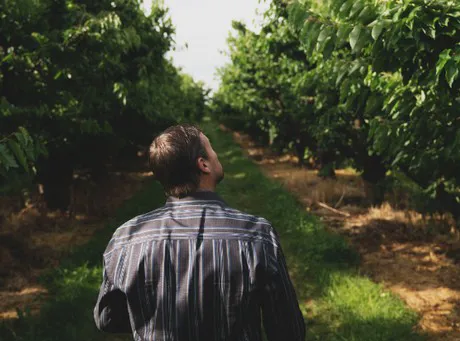The latest estimate for the Washington 2018 apple crop is showing a slight decline from the start of the season. Growers say this is based on how the harvest is going and what kinds of yields the trees are producing right now. Quality is very good though, with apples for the fresh market as well as the storage crop looking good.
"The latest official estimate is around 116.8 million boxes, which has been adjusted downward from an early estimate of around 131 million cases," said Brett Calhoun of Vanguard Pride. "Everything that we are seeing from the orchard to the pack line is making everyone happy- it looks to be an excellent eating apple season and we expect it will be an apple that stores will want to carry through the season."
Acreage for newer varieties continues to increase
A browse of the apple varieties in store now demonstrates how much has changed in the last 10 - 20 years. Many of the favorites of previous decades have been replaced with newer varieties, some of which have only been in production for several years. Consequently, the makeup of the Washington crop is also adjusting accordingly, with some of the traditional varieties making way for newer apples. We have recently witnessed the change of the apple in the number 1 spot - now Gala - which has been held by Red Delicious for decades. Red Delicious is now number two.
"The Washington State Tree Fruit Association (WSTFA) has the overall crop makeup as Gala – 24 percent, Red Delicious – 21 percent , Fuji – 13 percent, Granny’s 13 percent, Honeycrisp 11 percent and Pink Lady aka Cripps Pink at 4 percent," Calhoun noted. "Vanguard Pride's main varieties include Gala, Honeycrisp, Granny, Fuji, and Cripps Pink. Honeycrisp, Gala, and Fuji are all new plantings for us this year and are made up of all high-color strains. We will continue to decrease the acreage of Red and Golden Delicious and replant them with new varieties and systems."

Too many varieties?
The question has been raised whether or not there are now too many varieties of apples on the market. After all, potentially introducing a new variety doesn't necessarily attract new consumers to this everyday fruit, but can potentially cannibalize demand from other varieties. Additionally, marketing efforts seem to be becoming more elaborate and well-funded, prompting the thought that marketing dollars might drive demand.
"The proliferation of varieties continues to be talk of 'SKU – Rat' but as yet have not seen a significant reduction," said Craig Stauffer of The Vanguard International Group. "It’s been impressive to see Cosmic Crisp committing to a $10M marketing budget - will that be the beginning of the battle for share of shelf and share of stomach?"
Despite the marketing efforts though, Stauffer believes that at the end of the day, taste and quality will win out. "As is true for all fresh produce, taste and quality will always rule the day as the consumer will always be looking for value for money," he said.
Export markets diversifying
The hot topic this year has been the trade talks between the United States and China, along with the seemingly ever-escalating tariffs. As a significant export commodity - particularly for Washington state - the state of the apple export market is being closely watched and the impact of the tariffs will no doubt be felt this season. Growers are naturally concerned, however, it seems to have opened the way for other markets to flourish.
"Vanguard Pride certainly recognizes the potential impact of the China - US trade talks," Stauffer explained. "Through our sales and marketing partner Sage we are fortunate to have strong programs in the USA, Mexico and Canada. The 'direct' impact of the potential loss of China is negligible – however, we fully understand that no one in this industry works in a bubble. There are always downstream repercussions when market access is limited which hurts all parties involved."
"We are delighted to see that the US, Mexico and Canada have reached an agreement post NAFTA," he continued. "A tariff in our view is really only a tax on consumers and certainly does not benefit growers. The downward pressure the uncertainly created on the Mexican Peso and the Canadian dollar also negatively impact exports so we are happy to see the resumption of trade between these important trading partners. Other important markets for Vanguard include India, Indonesia, Hong Kong, Taiwan, Singapore, Thailand and Bangladesh."
Vanguard Fresh in the Sage booth at PMA
Vanguard Pride's sales and marketing partner Sage Marketing (www.sagefruit.com) will be at PMA Fresh Summit along with the Vanguard global team. You can find Sage at Booth #927.
For more information:
Brett Calhoun
Vanguard Pride
Tel: +1 (509) 877-3836
Craig Stauffer
The Vanguard International Group
Tel: +1 (425) 557-8250
sales@vanguardteam.com
www.vanguardteam.com
